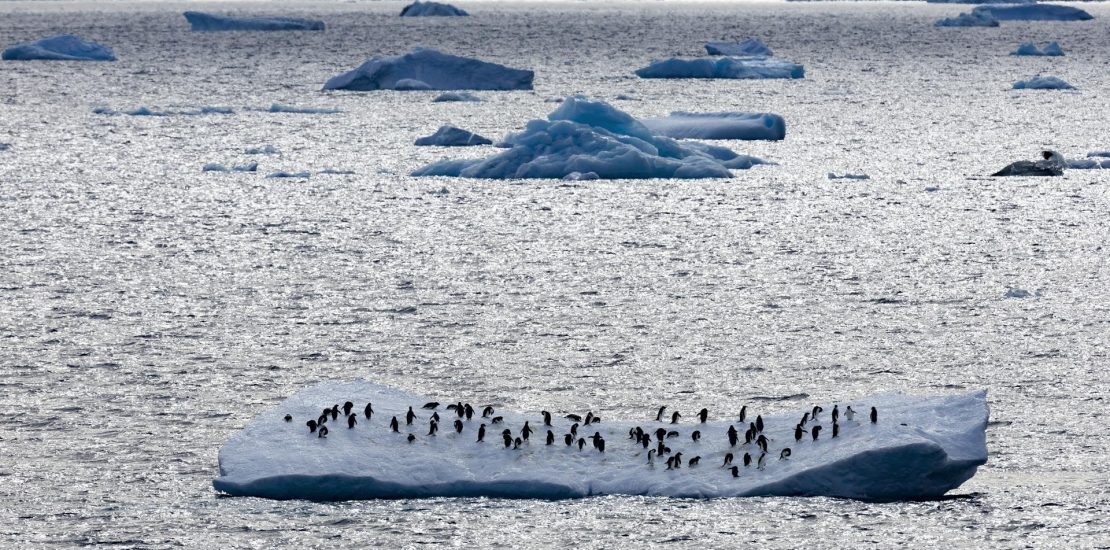Key Antarctic meeting calls for governments to protect Antarctica and wildlife amid escalating climate crisis
- May 20, 2024
- Posted by: Elaine Coles
- Category: Environmental, Global, Arctic & Antarctica

The 46th Antarctic Treaty Consultative Meeting (ATCM) begins in Kochi, India, this week amid growing alarm about the impacts of the climate crisis, human activities, and avian flu on Antarctica’s fragile ecosystems and iconic wildlife.
The Antarctic and Southern Ocean Coalition (ASOC) is urging Parties to the Antarctic Treaty to recall the spirit of collaboration at the heart of the Treaty and seize this opportunity to adopt robust measures to reduce and prevent impacts on Antarctic ecosystems.
In response to a steady growth in Antarctic tourism, this year’s ATCM will have a special focus on tourism and is expected to start work on a comprehensive framework for managing the impact of the steadily rising numbers of people visiting Antarctica, including enforceable rules and regulations.
ASOC is advocating for a holistic approach and protection to be rapidly scaled in line with the Convention on Biological Diversity’s Global Biodiversity Framework target of at least 30% terrestrial and marine protection.
“Formal regulation of tourism has been delayed for too long. However, the upcoming ATCM offers a crucial opportunity to finally adopt enforceable regulations and prevent impacts on Antarctica’s biodiversity.” said Claire Christian, ASOC’s Executive Director.
The increasing numbers of tourists and research stations in the region also means more microplastics and “gray water”–the water used for bathing, laundry, etc.–discharged into Antarctica’s waters. Gray water discharges, which often include microplastic fibers from synthetic clothing fabrics, are currently unregulated. Microplastics have already been detected in Antarctic waters and species. To combat the emerging threat, ASOC and its members are calling on ATCM to impose stricter requirements on vessels and research stations.
ASOC is also supporting the designation of the emperor penguin as a Specially Protected Species, which is threatened with significant population declines by 2100 due to accelerating climate change in the region.
The proposal is underlined by a recent study by the British Antarctic Survey that found record-low sea-ice levels caused entire colonies of emperor penguin chicks to perish last year and warned their populations could plummet by 99% by the end of the century. The ATCM has not been able to reach consensus on this proposal in previous years despite clear and compelling evidence–but must act now to protect this iconic species. Partner quotes
“The Antarctic ecosystem plays a vital role in regulating the planet’s climate by storing carbon, recycling nutrients, and producing life-sustaining oxygen. However, this fragile region faces growing threats from climate change, concentrated fishing, and pollution, jeopardizing its essential functions and the well-being of our entire planet. With global leaders committing to safeguarding at least 30% of the world’s oceans by 2030, the upcoming annual Commission for the Conservation of Antarctic Marine Living Resources meeting offers a clear opportunity to take an essential step toward that goal by designating new protected areas in the Antarctic Peninsula. By safeguarding the Southern Ocean, our leaders can demonstrate their resolve to uphold their responsibilities as environmental stewards,” said Andrea Kavanagh, director of Antarctic and Southern Ocean conservation work for the Pew Bertarelli Ocean Legacy Project.
Pam Pearson, Director of International Cryosphere Climate Initiative commented:
“The climate crisis is unfolding at an alarming pace, and the cryosphere, a critical component of our planet’s ecological balance, is bearing the brunt of this crisis with unprecedented speed and severity. As our 2023 State of the Cryosphere Report warned, even 2°C of global warming would mean losing significant portions of both polar ice sheets, leading to irreversible and catastrophic sea level rise. It’s time at ATCM to recognize the global importance of Antarctica’s most essential “ecosystem service” – keeping its ice sheets intact through sufficiently urgent action to reduce fossil fuel emissions, to slow the impacts of climate change on vulnerable low-lying regions far from the poles. The fate of Antarctica, and thus of the planet as humanity has known it, hangs in the balance.”
